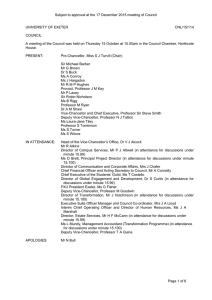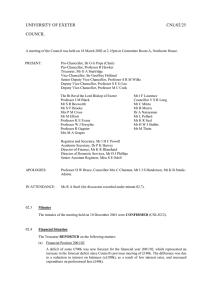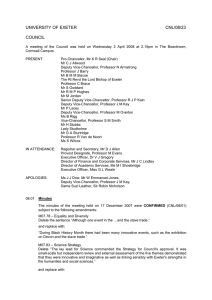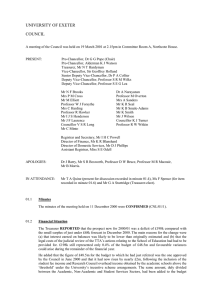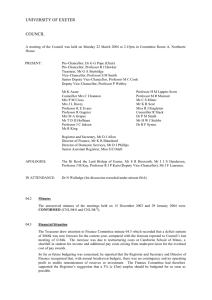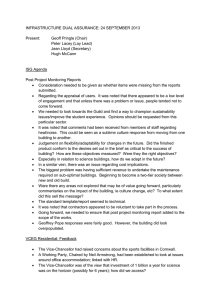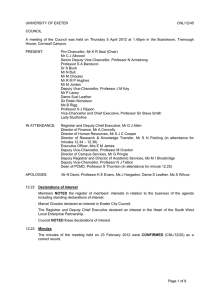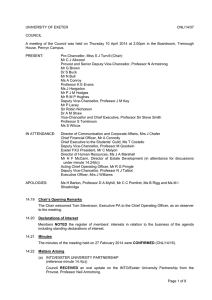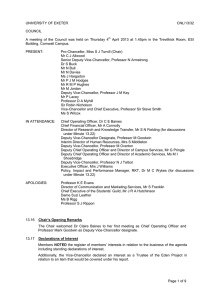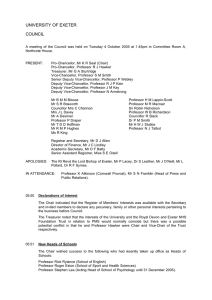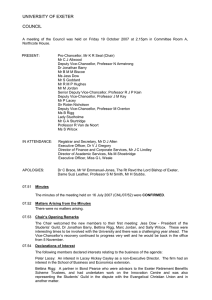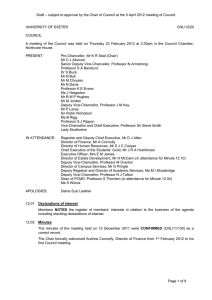UNIVERSITY OF EXETER CNL/12/101 amended COUNCIL
advertisement
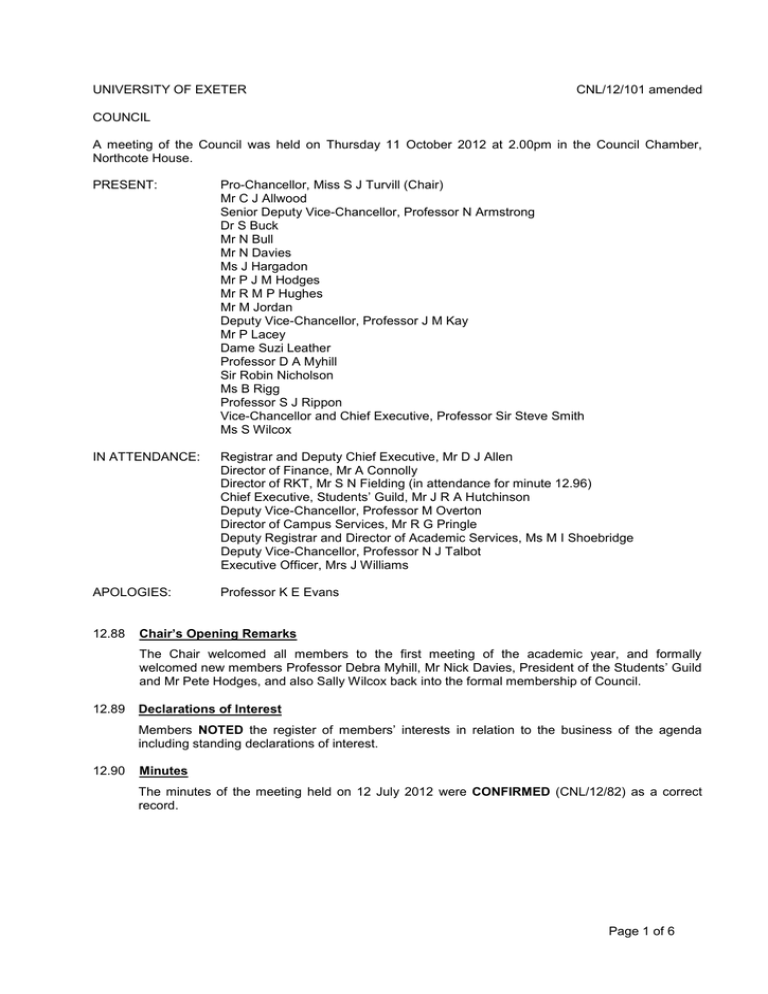
UNIVERSITY OF EXETER CNL/12/101 amended COUNCIL A meeting of the Council was held on Thursday 11 October 2012 at 2.00pm in the Council Chamber, Northcote House. PRESENT: Pro-Chancellor, Miss S J Turvill (Chair) Mr C J Allwood Senior Deputy Vice-Chancellor, Professor N Armstrong Dr S Buck Mr N Bull Mr N Davies Ms J Hargadon Mr P J M Hodges Mr R M P Hughes Mr M Jordan Deputy Vice-Chancellor, Professor J M Kay Mr P Lacey Dame Suzi Leather Professor D A Myhill Sir Robin Nicholson Ms B Rigg Professor S J Rippon Vice-Chancellor and Chief Executive, Professor Sir Steve Smith Ms S Wilcox IN ATTENDANCE: Registrar and Deputy Chief Executive, Mr D J Allen Director of Finance, Mr A Connolly Director of RKT, Mr S N Fielding (in attendance for minute 12.96) Chief Executive, Students’ Guild, Mr J R A Hutchinson Deputy Vice-Chancellor, Professor M Overton Director of Campus Services, Mr R G Pringle Deputy Registrar and Director of Academic Services, Ms M I Shoebridge Deputy Vice-Chancellor, Professor N J Talbot Executive Officer, Mrs J Williams APOLOGIES: Professor K E Evans 12.88 Chair’s Opening Remarks The Chair welcomed all members to the first meeting of the academic year, and formally welcomed new members Professor Debra Myhill, Mr Nick Davies, President of the Students’ Guild and Mr Pete Hodges, and also Sally Wilcox back into the formal membership of Council. 12.89 Declarations of Interest Members NOTED the register of members’ interests in relation to the business of the agenda including standing declarations of interest. 12.90 Minutes The minutes of the meeting held on 12 July 2012 were CONFIRMED (CNL/12/82) as a correct record. Page 1 of 6 12.91 Matters Arising from the Minutes (a) EXETER SCIENCE PARK (COMMERCIAL IN CONFIDENCE) (reference minute 12.62(c)) (b) COLLECTIVE BARGAINING (COMMERCIAL IN CONFIDENCE) (reference minute 12.62(b)) (c) THOMAS HALL (COMMERCIAL IN CONFIDENCE) (reference minute 12.51(d)) (d) FINANCIAL FORECAST (COMMERCIAL IN CONFIDENCE) (reference minute 12.55) 12.92 Terms of Reference and Membership Council NOTED the Terms of Reference and Membership for Council and the Standing Committee of Council for 2012/13 (CNL/12/84). It was also noted that a full review of the Charter, Statutes and Ordinances was being undertaken which would set out the formal schemes of delegation more clearly. The University supported the aim to maintain the rotation of lay members on Council although it was noted that this had become slightly out of kilter recently. Rotation of members would be possible in 2013 if Council wished. 12.93 Vice-Chancellor’s Report (a) Council RECEIVED a report from the Vice-Chancellor (CNL/12/85), which covered the following topics: (i) Announcements: the death of Professor Nicholas Goodrick-Clarke, Professor in the College of Humanities and Director of the Centre for the Study of Esotericism, who sadly passed away on 29 August 2012 after a short illness. following a period of ill health, the Director of Human Resources, Stephen Cooper, would be moving into a new role in the New Year after a period of recovery, as a consultant, from home on a part time basis, helping to identify potential candidates for professorial appointments. [Post meeting note: in the event Mr Cooper decided to make a clean break.] (ii) The University had been named University of the Year by The Sunday Times. This was a prestigious award and external validation of the University’s numerous successes over the past twelve months. The University had been ranked 7th in the Sunday Times league table, its highest ever ranking, and was also ranked best in the Southwest region for teaching. (iii) Appointment of Registrar and Secretary - the deadline for applications for the position of Registrar and Secretary had now passed. (iv) INTO (COMMERCIAL IN CONFIDENCE) (v) Research Grant Successes in the Business School - the Business School had recently been awarded a £4.3 million Economics and Social Research Council (ESRC) Research Centre, and in addition had received a second 5 year ESRC Research Centre in partnership with HMRC with funding of £2.3 million. (vi) National Student Survey - the University had once again performed exceptionally strongly in this year’s National Student Survey. It was ranked sixth for overall satisfaction amongst full service universities and third for teaching. In addition, more than half of its subjects were in the top 10 for overall satisfaction. (vii) Admissions - Council members had already received a full analysis via email of this year’s admissions situation. This year had, undoubtedly, been one of the most difficult Page 2 of 6 admissions rounds in recent years. Council members would see from the Report from the VCEG Residential meeting that key aspects of next year’s admissions strategy had already been agreed and Council would be fully briefed on the 2013 strategy at the Council Away Day in November. (viii) UCAS Board Chairmanship – the Vice-Chancellor has been appointed Chair of the UCAS Board, following the resignation of Professor David Eastwood who had recently become Chair of the Russell Group. (b) In addition to the written report, the Vice-Chancellor drew attention to the following: (i) A warm welcome was extended to the new Chair of Council, Sarah Turvill, and members wished her well in her first meeting. (ii) Exeter had risen to 153 in the world in the Times Higher Education (THE) University World Rankings. This was a rise of three places and was a fine achievement against a decreasing trend for the UK. There was still a great deal of work to do to dis-entangle the University from PCMD and the planning team would be working to ensure that Exeter contracts were correctly recorded. rd (iii) The University had been shortlisted for the THE University of the Year award, the th winner of which would be announced on the 29 November. (iv) The long listing for the appointment of the new Registrar would be taking place on th October 12 . There was a good field with six sitting registrars amongst the candidates from both Russell Group and 1994 Group institutions. Interviews would take place on th the November 27 . (v) (COMMERCIAL IN CONFIDENCE) (vi) (COMMERCIAL IN CONFIDENCE) (vii) The University had done extremely well in the 2012 admissions cycle. The national data showed that there were 54,000 fewer students entering Higher Education (HE) in 2012. The reduction in the percentage of deferrals this year accounted for 23,000 of these students. There had also been a 15.3% reduction in AABs. However, Exeter had increased its market share of AABs from 4.2% to 4.9%. The University would now look at three issues in relation to the ABB / BBB world; what were the predicted numbers for ABB and BBB at each campus, were all subjects sustainable and could commitments to social inclusion be met? In discussion with members the following points were noted: It was hoped that there would be a clear indication from HEFCE soon about recruitment of ABB or BBB students. The University would then be able to look at the flexibility it had and any issues it would face; particularly in relation to Cornwall. The University was in a good position for 2013 admissions, with 400 AAB+ students having deferred from 2012. Whilst it would be difficult to predict the number of AAB+ students nationally for next year, particularly around the socio-economic cohort, a number of other factors could be analysed. Students taking only the Cambridge Pre-U qualification did not present an issue in relation to equivalence. However, there was an issue where students undertook a combination of Pre-U and A-Level qualifications as they were not exempt from Student Number Control (SNC) limits. For this cycle the University had taken a policy decision to use its SNCs for Cornwall and Widening Participation rather than taking students with Pre-U and A Levels, however it would be lobbying to include these students in equivalence for next year. The report from Professor Nicky Britten’s task and finish group would be brought to Council in December where sufficient time would be scheduled for discussion. It was noted that it would be useful for this discussion to cover gender and age data in relation to stress. Page 3 of 6 12.94 VCEG Residential 2012 (COMMERCIAL IN CONFIDENCE) 12.95 Finance (a) FINANCIAL POSITION 2011/12 Council CONSIDERED the financial position for 2011/12 (CNL/12/87). The report provided an overview of the provisional unaudited outturn for 2011/12. The external audit of the statutory accounts was currently underway and therefore the figures were subject to change. At a time of accumulated funding cuts and lack of economic growth the outturn represented a good performance. Total income grew by nearly 5% over the year to £258m driven by nearly 8% growth in research grant income to £49.9m and 34% growth in overseas tuition fees to nearly £41m. The draft historic cost surplus for the year ended 31 July 2012 was £8.7m, which included the bonus provision of £0.9m. This was £7.5m higher than the original budget. If accounting provisions were stripped out the underlying surplus would reduce to £6.7m; still £5.5m higher than the original budget. The provision proposed in relation to Landisbanki represented an extremely prudent approach and was a reversal of the University’s previous intention to release the provision. This followed the latest professional advice and assumed no further recovery. Overall Colleges outperformed their forecast surplus by £200k but within that there was a much larger and adverse variance relating to research income and earnings. Total income fell short of the last forecast by £3.8m, of which £3.2m was in one College. Earnings fell short by £2.5m. Some of this variance was due to the complex mix of University IT systems, some was due to the lag between award and start up being longer than anticipated and some was due to the setting of demanding performance targets. Work would be undertaken with Colleges to ensure better forecasting of income and earnings for research in the future. The Business School significantly outperformed its budgeted surplus but this was captured in the last forecast. However, underlying levels of performance must be captured in the budget so that the University’s ability to invest was not constrained. Professional Services produced a favourable variance of £1.3m compared to its last forecast; half of which came from improved performance from Campus Services. Members were reminded that the draft Financial Statements would be submitted to Audit Committee at its next meeting and then circulated to Council electronically for their approval. It was essential that all members approved the documents, sending any queries to the Director of Finance or Pro-Chancellor (Finance), copying the Registrar and Deputy Chief th Executive, by 26 November at the latest. The Registrar and Deputy Chief Executive noted that the financial target for release of the University Bonus had been meet. In addition the University had met its target for Top 10 and CO2 reduction but had fallen slightly short of the target for research income. However, VCEG (none of whose members personally benefitted) felt that the Sunday Times award and Russell Group membership had compensated for this and were therefore recommending that the University bonus of £300 be paid in full in December to eligible staff. Council ENDORSED this recommendation. VCEG would come back to Council with further recommendations on bonus metrics for 2013. The Pro-Chancellor (Finance) commended the report to members. Faced with the bottom of the “Valley of Death” the outturn achieved was very good. The University had invested heavily in capital again whilst net borrowings had only risen by 16%. In discussion with members the following points were noted: Four out of six Colleges had declared adverse variances for research income. There were some structural issues around the interface between Finance and Research and Knowledge Transfer (RKT) and these were being worked on. In addition the Armstrong Review would need to ensure that the correct targets were being set. Page 4 of 6 The College of Engineering, Mathematics and Physical Sciences (CEMPS) had experienced a spike in third quarter awards, some of which were very complex. A number of grants had not started on time which had resulted in a large increase in income after the financial year end. The underlying performance of CEMPS was strong. It was AGREED that the pipeline for grants should be included in future financial reports so that members could understand if income issues were just timing related. (b) FINANCIAL STRATEGY (COMMERCIAL IN CONFIDENCE) (c) EXETER RETIREMENT BENEFITS SCHEME (ERBS) ACTUARIAL VALUATION RESULTS (COMMERCIAL IN CONFIDENCE) (d) UNIVERSITY OF EXETER INVESTMENTS GROUP Council RECEIVED a presentation from investment advisors, JP Morgan. Council members, as Trustees, had ultimate responsibility for the investment of the University’s funds but under the dual assurance system delegated the management and oversight of investment activity to the dual assurance partnership of the Director of Finance and Pro-Chancellor (Finance). To ensure the work of the University’s investment managers was overseen effectively, an ‘Investment and Endowment Group’ had been formed to meet twice a year. Its role was focused on monitoring investment performance and the development and management of endowment policies. The group would be made up of the Director of Finance, Pro-Chancellor (Finance), Nicholas Bull, Clare Berthoud (an Exeter Alumna) and Hugh MacDougald (Exeter Alumnus and Head of Private Client Practice, Winckworth Sherwood). Through the dual assurance process, the Investment and Endowment Group and the appointment of professional fund managers in the form of JP Morgan, Council was able to fulfil its legal requirement as Trustees. Tom Rutherford and Richard Beggs from JP Morgan provided an overview of the funds held, how they were invested and the returns they were generating. It was NOTED that: The returns had been good thus far and favourable compared to benchmarks. The returns were net of fees. The differential between the portfolio performance and the reference index was due to the fact that currency movements had been adverse this year. JP Morgan would usually hedge currency risk but the legal contracts in place for the University did not allow for this. The contract would be revisited with the University’s Investment and Endowment Group. Whilst JP Morgan did not directly invest in the tobacco markets, there were no restrictions on this happening indirectly. Therefore it would not be possible to state that this was an ethical fund. The University might be encouraged to consider social investments. Whilst this was a fairly under-developed market, JP Morgan did have some expertise and had introduced other clients to social funds. There could be opportunity for the University to be at the forefront of social investment and signal that it was something it was prepared to do. 12.96 Living Systems Building (COMMERCIAL IN CONFIDENCE) (reference minute 12.68) Sean Fielding in attendance 12.97 Campaign and Campaign Feasibility - Phase 2 (reference minute 11.111) It was agreed that Council would RECEIVE a presentation from the Directors of DARO and RKT on the feasibility report at its awayday meeting in November. 12.98 Audit Committee Council RECEIVED an oral report from the Chair of Audit Committee on the meeting held on 4 October 2012. Over the year there has been an encouraging reduction in the number of points raised by the internal auditors. This reflected well on the University’s management of risk. Page 5 of 6 The audit on research council funding gave a very positive report indeed on how the funding had been expended. Research grant managers were to be congratulated. However, it did note that in 2010/11 the University had fallen from 30th to 31st in research council funding despite a £9m increase in income. This indicated that competitors were working hard to increase their position too. 12.99 Ethics Committee Council RECEIVED the annual report from the Ethics Committee (CNL/12/92). 12.100 Staff Learning and Development Council RECEIVED the annual report 2011/12 from Staff Learning and Development (CNL/12/93). 12.101 Council Self-Evaluation Questionnaire Council NOTED the outcome of the Council Self-Evaluation Questionnaire (CNL/12/94). 12.102 Statutes and Ordinances Council NOTED Chair’s action in respect of amendments to Statutes and Ordinances relating to the University of Exeter Medical School (CNL/12/95). 12.103 Council Nominations Committee: Appointment of Trustee to ERBS Council APPROVED the appointment of Peter Gale as a Trustee to ERBS (CNL/12/96), 12.104 Bill Douglas Centre Council APPROVED the submission of the following documents (CNL/12/97) to the Arts Council England as part of the Centre’s accreditation application: (a) The Bill Douglas Centre Forward Plan 2012 to 2015 (b) The Bill Douglas Centre Mission, Constitution and & Governance Policy 2012 (c) The Bill Douglas Centre Collections Development Policy 2012. 12.105 Engagement with FE Deputy Vice-Chancellor, Professor Janice Kay, noted that since the paper (CNL/12/98) had been written the position had consolidated to just one University Technical College (UTC) initiative with South Devon College. The second bid would not go ahead with Exeter College. Instead the University and Exeter College would be focusing on the bid to develop a Mathematics Specialist School. There were no financial implications attached to these initiatives and CEMPS had the management capacity to undertake this. Council APPROVED the submission to progress with the University Technical College (UTC) and the Mathematics Specialist College. Professor Janice Kay was AUTHORISED by Council to represent the University as a member of the University Technical College (UTC) and Specialist College and to act on behalf of the University in all matters relating to them; including the formation of separate legal entities. 12.106 Affixing the Seal Council AUTHORISED the fixing of the University seal to the documents listed in CNL/12/99. 12.107 HEFCE’s Annual Assessment of Institutional Risk Council RECEIVED HEFCE’s annual assessment of institutional risk (CNL/12/100) and noted that the University continued to be ‘not at high risk’. 12.108 Chair’s Closing Remarks (COMMERCIAL IN CONFIDENCE) JW/JAL 11 October 2012 (amended 27 November 2012) M:\Exec Officer\COUNCIL\2012-13\October 2012\Final Council Minutes 11 October 2012.doc Page 6 of 6
